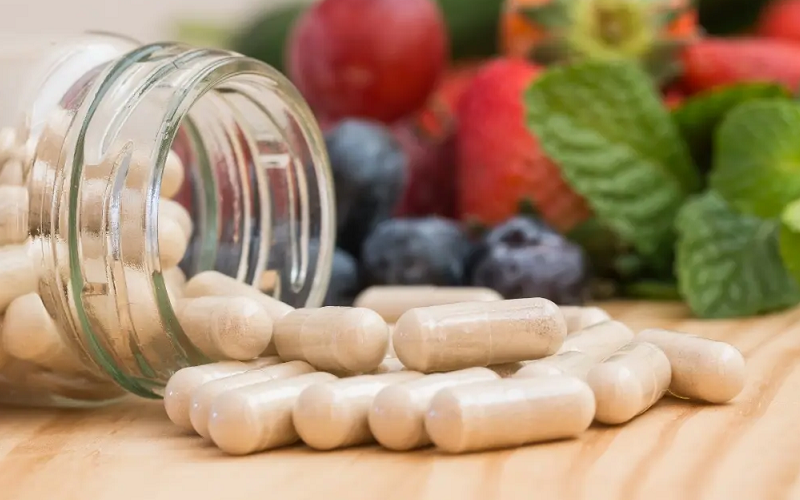
Aging is an inevitable journey that every living organism embarks on, marked by the passage of time and the gradual decline of bodily functions. While the aging process is natural and universal, the manner in which we age can vary significantly, influenced by a myriad of factors including genetics, lifestyle, and environmental exposures. In recent years, the spotlight has turned to the potential of antioxidant supplements in altering the trajectory of aging, promising a route to aging more gracefully by mitigating the detrimental effects of oxidative stress on the body.
Oxidative stress, a condition arising from an imbalance between free radicals and antioxidants, is a key player in the aging process, contributing to the development of chronic diseases, the deterioration of physical functions, and the visible signs of aging skin. Antioxidants, whether sourced from a diet rich in fruits and vegetables or from supplements, have been hailed for their ability to neutralize free radicals, potentially slowing down the aging process and enhancing overall health and longevity.
Contents
- Introduction to Aging and Antioxidants
- The Science of Aging and Oxidative Stress
- Antioxidant Supplements: Types and Sources
- The Impact of Antioxidant Supplements on Aging
- References
Introduction to Aging and Antioxidants
Aging Gracefully is a concept that resonates deeply with many individuals, conjuring images of vitality, health, and wisdom through the years. Yet, the journey towards such an idyllic state is often fraught with challenges, chief among them the biological process of aging itself. This inevitable progression, marked by a gradual decline in physical and, sometimes, cognitive functions, is influenced by both genetic and environmental factors. However, recent scientific advancements suggest that this journey can be navigated with greater grace and vitality than previously thought possible, with antioxidant supplements emerging as a potential key player.
Definition of Aging
Aging is a natural process experienced by every living organism. It is characterized by the gradual deterioration of physiological functions, leading to an increased risk of various diseases and ultimately, death. The aging process is influenced by a complex interplay of genetic, environmental, and lifestyle factors, each contributing to the unique way individuals age.
Overview of the Natural Aging Process
The natural aging process is a multifaceted phenomenon that encompasses physical, psychological, and social changes. Physiologically, it involves the decline of cellular function over time, while psychologically, it can affect cognitive function and emotional well-being. Socially, aging impacts an individual’s role and relationships within society. Understanding these aspects is crucial for grasifying the full scope of aging.
Introduction to Antioxidants and Their Significance
Antioxidants are molecules capable of slowing or preventing the oxidation of other molecules, thereby playing a critical role in protecting the body from the damaging effects of free radicals. Free radicals are unstable atoms that can damage cells, contributing to aging and diseases. The body naturally produces antioxidants, but this defense mechanism often weakens with age, highlighting the importance of external sources of antioxidants, such as supplements, in maintaining health and vitality.

The Science of Aging and Oxidative Stress
The journey through aging is a complex and multifaceted process that has intrigued scientists and philosophers for centuries. At the heart of this exploration is the quest to understand the biological mechanisms that drive the aging process and the role of oxidative stress in accelerating it.
Explanation of Cellular Aging
Cellular aging, also known as senescence, is a natural part of the life cycle of a cell. As cells age, they undergo a series of changes that diminish their function and eventually lead to their death. This process is influenced by a variety of factors, including genetic telomere shortening, accumulation of DNA damage, and cellular stress. Each of these factors contributes to the gradual decline in physiological function observed in aging organisms [1].
The Role of Free Radicals in Aging
Free radicals are highly reactive molecules with unpaired electrons, which can cause significant damage to cells, proteins, and DNA by stealing electrons from other molecules—a process known as oxidation. While the body utilizes free radicals for essential functions, such as fighting infections, an imbalance where free radicals outnumber antioxidants leads to oxidative stress, exacerbating the aging process and contributing to the development of age-related diseases.
Understanding Oxidative Stress
Oxidative stress occurs when there is an imbalance between the production of free radicals and the body’s ability to counteract their harmful effects with antioxidants. This imbalance can lead to cellular damage and is implicated in a variety of age-related conditions, including cardiovascular disease, Alzheimer’s disease, and cancer. Oxidative stress is not only a consequence of aging but also a contributor, creating a vicious cycle that accelerates the decline in health and function.
Antioxidants: The Body’s Defense Mechanism
Antioxidants play a crucial role in neutralizing free radicals and preventing them from causing cellular damage. These molecules can safely interact with free radicals and terminate the chain reaction before vital molecules are harmed. The body produces several antioxidant enzymes endogenously, such as superoxide dismutase (SOD), catalase, and glutathione peroxidase. Additionally, dietary antioxidants, such as vitamins C and E, beta-carotene, and selenium, supplement the body’s defenses, offering an external line of protection against oxidative stress [2].
Antioxidant Supplements: Types and Sources
In the quest to combat the effects of oxidative stress and support the body’s aging process gracefully, antioxidant supplements have emerged as a significant area of interest. These supplements promise to bolster the body’s natural defense system against the onslaught of free radicals, potentially mitigating the effects of aging.
Common Types of Antioxidant Supplements
Antioxidant supplements come in various forms, each with its unique properties and benefits. Understanding these can help individuals make informed decisions about their health regimen.
- Vitamin C: Known for its immune-boosting properties, Vitamin C is a potent antioxidant that helps protect cells from free radical damage. It also plays a crucial role in collagen production, promoting skin health and wound healing.
- Vitamin E: This fat-soluble antioxidant helps protect cell membranes from oxidative damage. It’s particularly important for skin health and can help prevent the signs of aging.
- Beta-Carotene: A precursor to Vitamin A, beta-carotene is another powerful antioxidant. It’s known for its role in maintaining vision, supporting immune function, and protecting skin health.
- Selenium: This trace mineral acts as a cofactor for antioxidant enzymes, helping to prevent cellular damage from free radicals. Selenium is also important for thyroid function and immune response.
Natural Sources vs. Supplemental Forms
While antioxidant supplements are widely available, it’s essential to consider the benefits of obtaining these nutrients from natural food sources. Foods rich in antioxidants not only provide a broad spectrum of nutrients but also offer dietary fiber and other beneficial compounds that supplements cannot replicate [3].
- Fruits and Vegetables: The richest sources of antioxidants like Vitamin C and beta-carotene. Incorporating a variety of colorful produce can ensure a broad intake of antioxidants.
- Nuts and Seeds: Excellent sources of Vitamin E and selenium, nuts and seeds are a healthy addition to the diet that supports antioxidant intake.
- Whole Grains: Some whole grains are good sources of selenium and other antioxidants, contributing to a balanced diet.
How to Choose the Right Antioxidant Supplements
Choosing the right antioxidant supplements involves several considerations to ensure they meet individual health needs and complement the diet effectively.
- Quality and Purity: Look for supplements from reputable manufacturers that adhere to high production standards and undergo third-party testing for quality and purity.
- Dosage and Formulation: It’s important to choose supplements with appropriate dosages that reflect the daily recommended intakes for these nutrients. Some formulations may combine several antioxidants for synergistic effects.
- Individual Health Needs: Consider personal health conditions, dietary restrictions, and potential interactions with medications. Consulting with a healthcare professional can provide guidance tailored to individual needs.
Incorporating antioxidant supplements into the diet offers a proactive approach to supporting the body’s defense against oxidative stress and aging. By understanding the types of antioxidants available, their sources, and the considerations for choosing supplements, individuals can make informed decisions that enhance their overall health and well-being [4].

The Impact of Antioxidant Supplements on Aging
As the quest for longevity and healthful aging continues, the role of antioxidant supplements in mitigating the effects of aging takes center stage. The relationship between antioxidants and the aging process is a subject of extensive research, offering promising insights into how these powerful compounds can influence health, cognitive function, and longevity.
Scientific Evidence: Benefits of Antioxidants in Aging
The body of scientific evidence exploring the impact of antioxidant supplements on aging is growing, with numerous studies highlighting their potential to counteract oxidative stress—one of the critical mechanisms underlying aging and age-related diseases. Antioxidants such as Vitamin C, Vitamin E, beta-carotene, and selenium have been shown to protect cells from oxidative damage, thereby potentially reducing the risk of chronic conditions like heart disease, Alzheimer’s disease, and certain cancers.
Reduction in Oxidative Damage
Research indicates that antioxidant supplements can reduce markers of oxidative stress in the body, offering a protective effect against cellular damage.
Enhancement of Cellular Repair Mechanisms
Some antioxidants have been found to enhance the body’s natural repair processes, contributing to the maintenance of cellular health and function.
Antioxidants and Skin Health: Combating Aging Signs
The skin is the body’s largest organ and a primary indicator of aging. Oxidative stress contributes to the aging of the skin, manifesting as wrinkles, loss of elasticity, and uneven pigmentation. Antioxidant supplements have been studied for their potential to protect the skin from environmental stressors, including UV radiation and pollution [5].
Improvement in Skin Appearance
Studies have shown that supplements containing vitamins C and E, as well as beta-carotene, can improve skin texture and reduce the appearance of wrinkles, contributing to a more youthful complexion.
Protection Against UV Damage
Antioxidants can mitigate the harmful effects of UV exposure, reducing the risk of sunburn and long-term UV damage, which can lead to skin cancer.
Cognitive Function and Antioxidants: Maintaining Brain Health
The aging process can affect cognitive function, leading to concerns about memory loss, cognitive decline, and the risk of neurodegenerative diseases. Antioxidant supplements have been researched for their potential to protect brain cells from oxidative damage, thereby supporting cognitive health.
Support for Cognitive Performance
Some evidence suggests that antioxidants can help maintain cognitive function, potentially reducing the risk of cognitive decline and diseases such as Alzheimer’s and Parkinson’s.
Neuroprotective Effects
Antioxidants may offer protective effects for the brain, safeguarding neurons from oxidative stress and supporting the maintenance of neural pathways.
The Role of Antioxidants in Longevity and Disease Prevention
The ultimate impact of antioxidant supplements may extend beyond the mitigation of specific aging signs, playing a role in promoting longevity and preventing age-related diseases.
Reduction in Disease Risk
By combating oxidative stress, antioxidant supplements can contribute to a lower risk of developing chronic diseases, which are major contributors to mortality and morbidity in older populations.
Support for Longevity
While direct links between antioxidant supplementation and increased lifespan are still under investigation, the potential for antioxidants to enhance quality of life and reduce disease risk suggests a positive influence on longevity.
References
[1] Effects of antioxidant supplementation on the aging process
[2] Antioxidant Supplementation in the Treatment of Aging-Associated Diseases
[3] Exercise and antioxidant supplements in the elderly
[4] Food Antioxidants and Aging: Theory, Current Evidence and Perspectives
[5] Aging – Oxidative stress, antioxidants and computational modeling

